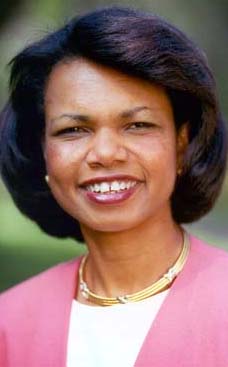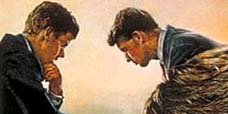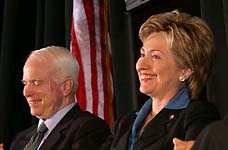
The government has sought to control what people read and write on the Web, employing a bureaucracy of censors and one of the world's most technologically sophisticated system of filters. But the success of those measures has been mixed. As a catalyst that amplifies voices and accelerates events, the Internet presents a formidable challenge to China's authoritarian political system. Again and again, ordinary Chinese have used it to challenge the government, force their opinions to be heard and alter political outcomes.
The Great Firewall of China
The Click That Broke a Government's Grip
By Philip P. Pan
Washington Post Foreign Service
Sunday, February 19, 2006; Page A01
[Excerpt]
BEIJING -- The top editors of the China Youth Daily were meeting in a conference room last August when their cell phones started buzzing quietly with text messages. One after another, they discreetly read the notes. Then they traded nervous glances.
Colleagues were informing them that a senior editor in the room, Li Datong, had done something astonishing. Just before the meeting, Li had posted a blistering letter on the newspaper's computer system attacking the Communist Party's propaganda czars and a plan by the editor in chief to dock reporters' pay if their stories upset party officials.
No one told the editor in chief. For 90 minutes, he ran the meeting, oblivious to the political storm that was brewing. Then Li announced what he had done.
The chief editor stammered and rushed back to his office, witnesses recalled. But by then, Li's memo had leaked and was spreading across the Internet in countless e-mails and instant messages. Copies were posted on China's most popular Web forums, and within hours people across the country were sending Li messages of support.
The government's Internet censors scrambled, ordering one Web site after another to delete the letter. But two days later, in an embarrassing retreat, the party bowed to public outrage and scrapped the editor in chief's plan to muzzle his reporters.
The episode illustrated the profound impact of the Internet on political discourse in China, and the challenge that the Web poses to the Communist Party's ability to control news and shape public opinion, key elements to its hold on power. The incident also set the stage for last month's decision to suspend publication of Freezing Point, the pioneering weekly supplement that Li edited for the state-run China Youth Daily.
Eleven years after young Chinese returning from graduate study in the United States persuaded the party to offer Internet access to the public, China is home to one of the largest, fastest-growing and most active populations of Internet users in the world, according to several surveys. With more than 111 million people connected to the Web, China ranks second to the United States.
Although just a fraction of all Chinese go online -- and most who do play games, download music or gossip with friends -- widespread Internet use in the nation's largest cities and among the educated is changing the way Chinese learn about the world and weakening the Communist Party's monopoly on the media. Studies show China's Internet users spend more time online than they do with television and newspapers, and they are increasingly turning to the Web for news instead of traditional state outlets.
The government has sought to control what people read and write on the Web, employing a bureaucracy of censors and one of the world's most technologically sophisticated system of filters. But the success of those measures has been mixed. As a catalyst that amplifies voices and accelerates events, the Internet presents a formidable challenge to China's authoritarian political system. Again and again, ordinary Chinese have used it to challenge the government, force their opinions to be heard and alter political outcomes.
The influence of the Web has grown over the past two years, even as President Hu Jintao has pursued the country's most severe crackdown on the state media in more than a decade. The party said last week that Freezing Point would resume publishing, but Li and a colleague were fired, making them the latest in a series of editors at state publications to lose their jobs.
With newspapers, magazines and television stations coming under tighter control, journalists and their audiences have sought refuge online. The party's censors have followed, but cyberspace in China remains contested terrain, where the rules are uncertain and an eloquent argument can wield surprising power.














